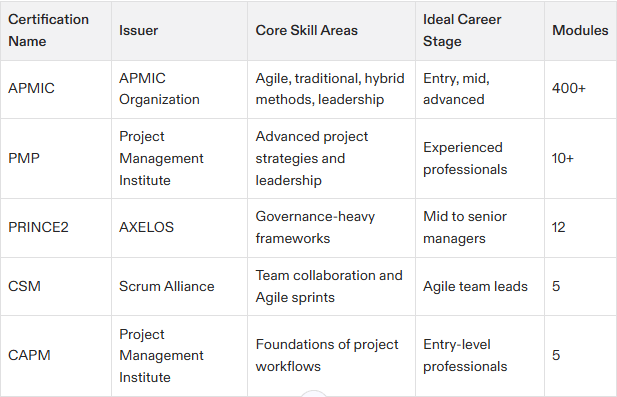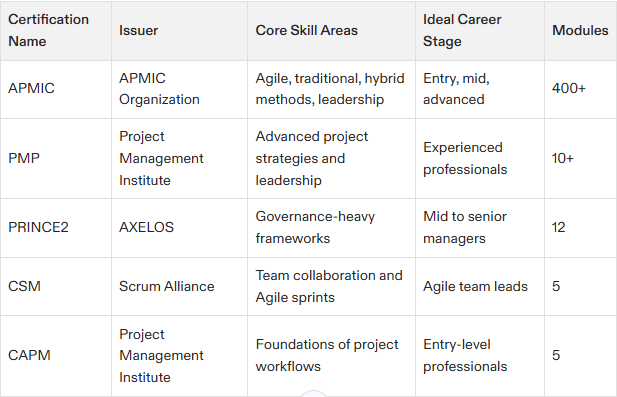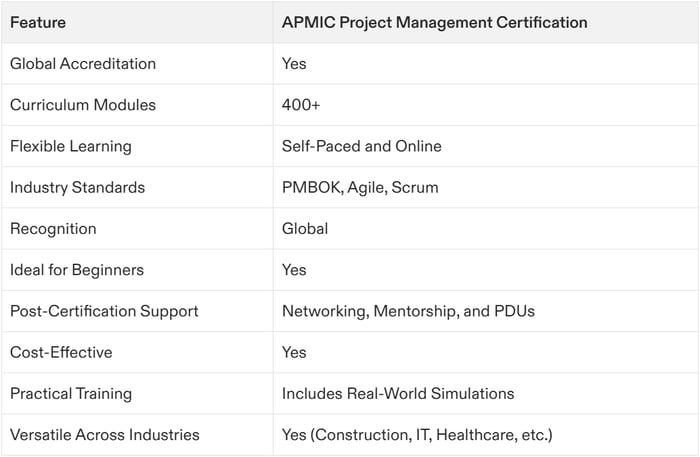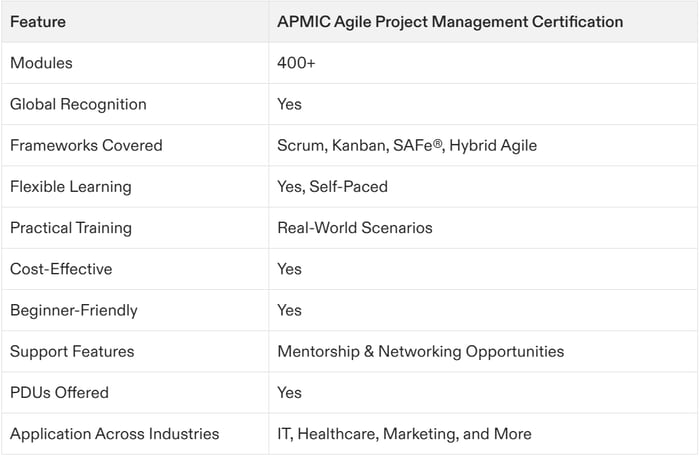Table of Contents
- Why Is It Important to Have a Project Management Certification?
- Which Project Management Certification is Best? Detailed Analysis of the Top 5 Project Management Certifications
- How to Decide Which Project Management Certification is Best?
- FAQs About Project Management Certification
- Which Project Management Certification is Best? Comparison Table
Which project management certification is best? With the growing complexity of projects in virtually all industries, having the right credentials not only showcases your expertise but also serves as a ticket to exciting opportunities. But which project management certification is best for you?
Certifications come in all shapes and sizes, tailored to specific career stages, industries, and goals. This detailed guide examines the five most recognized certifications in 2025 with deep insights into their structures, benefits, and outcomes. By the end, you'll understand which one will elevate your career to the next level.
Why Is It Important to Have a Project Management Certification?
Earning a project management certification demonstrates that you have the skills, knowledge, and qualifications to lead initiatives successfully. Here are a few key advantages:
Higher Earning Potential
Certified project managers consistently out-earn their non-certified peers by 20-25%. This financial benefit alone makes certification a worthwhile investment.Career Mobility
With certification, employers recognize you as a specialist who can handle complex projects, opening doors to senior and leadership roles.Global Recognition
Most certifications, including PMP and APMIC, are recognized worldwide, making you a viable candidate for global opportunities.Enhanced Skill Set
Certifications focus on project management fundamentals, advanced strategies, and tools—making you an expert in resource allocation, risk assessment, leadership, and communication.
Whether you are an industry veteran or a newcomer, obtaining the right certification demonstrates a commitment to your craft.
Which Project Management Certification is Best?
Detailed Analysis of the Top 5 Project Management Certifications
1. APMIC Certification
The New Industry Standard for Project Management
The APMIC certification has become the go-to choice for professionals seeking a robust, comprehensive credential. Known for its 400+ modules, this program covers everything from traditional project management techniques to advanced Agile methodologies.
Key Features:
- Multi-Level Curriculum
APMIC offers learning paths for beginners, mid-level managers, and experts. - Real-World Focus
Case studies, real-world exercises, and project scenarios ensure practical learning. - Cross-Industry Relevance
Whether you're in healthcare, IT, construction, or finance, the skills learned in APMIC’s program are universally applicable.
Who Should Choose This?
- Professionals seeking versatility in methodologies (Waterfall, Agile, Hybrid)
- Beginners looking for an accessible yet exhaustive introduction
- Leaders eager to expand into cross-industry project environments
APMIC’s flexibility and scope make it a powerhouse for anyone serious about growing their career. Discover more about APMIC’s project management certification here.
Career Paths:
From junior-level project assistants to senior roles like Program Manager or Portfolio Director, APMIC prepares you for any project-related challenge.
2. PMP (Project Management Professional)
The Globally Recognized Gold Standard
Offered by PMI, PMP is synonymous with high-level project management expertise. This project management certification is designed for professionals managing intricate project portfolios and large-scale operations.
Key Features:
- Tri-Focus Methodology
Covers predictive (traditional), Agile, and hybrid project management frameworks. - Intensive Preparation
PMP requires comprehensive study, including project management concepts, leadership strategies, and ethics. - Prestige and Recognition
PMP is recognized worldwide as a credential held by elite project managers.
Who Should Choose This?
- Senior project managers managing multinational or complex projects
- Executives in need of advanced leadership frameworks
Career Paths:
PMP certification often leads to roles such as Chief Projects Officer, Senior Project Manager, and Strategy Consultant.
Pro Tip: PMP demonstrates expertise but is not beginner-friendly, making it better suited for experienced professionals.
3. PRINCE2 (Projects IN Controlled Environments)
A Framework-Based Certification
PRINCE2, developed in the UK, is highly structured and favors a step-driven approach to project delivery, making it ideal for industries with high governance standards.
Key Features:
- Scalable and Adaptable
Tailors its project guidelines based on company size, project scope, and budget. - Detailed Documentation Focus
Teaches the importance of thorough record-keeping for accountability and evaluation. - Two-Tier Certifications
Includes PRINCE2 Foundation for beginners and PRINCE2 Practitioner for advanced users.
Who Should Choose This?
- Professionals in government, legal, or regulated industries
- Project managers looking for a structured, disciplined framework
Career Paths:
PRINCE2 certification enables you to work as a Project Management Consultant, Risk Manager, or Program Analyst.
Consideration:
While PRINCE2 focuses on structure, it’s less versatile in Agile and iterative environments.
4. Certified ScrumMaster (CSM)
Agile-Specific Certification for Today’s Adaptive Teams
CSM certification is highly favored in industries that prioritize Agile practices, like IT and marketing. It emphasizes leadership within self-organizing teams and the principles of continual improvement.
Key Features:
- Team-Centered Leadership
Educates on effective team collaboration and resolving impediments to success. - Sprint and Iteration-Based Management
Teaches how to manage workflows using Scrum frameworks effectively. - Interactive Learning
Includes gamified exercises and real-world simulations.
Who Should Choose This?
- Professionals operating in Agile environments
- Managers transitioning from traditional to iterative frameworks
Career Paths:
CSM certification paves the way for careers such as Scrum Master, Agile Coach, and Product Owner.
Key Insight:
CSM is heavily industry-specific. If Agile isn’t dominant in your workplace, other certifications like APMIC may be a better fit.
5. CAPM (Certified Associate in Project Management)
A Beginner-Friendly Gateway into Project Management
CAPM targets those with little to no experience in project management. It provides a foundational understanding of standardized project workflows.
Key Features:
- Entry-Level Accessibility
Requires no prior project management experience. - PMI Backing
Builds credibility for those planning to later pursue PMP certification. - Conceptual Focus
Centers on learning the principles of time, cost, and scope management.
Who Should Choose This?
- Early-career professionals or recent graduates
- Administrative roles aspiring to transition into project management
Career Paths:
CAPM certification is a great starting point for roles like Project Coordinator or Junior Project Manager.
Limitations:
While beginner-friendly, lack of advanced modules may make CAPM less ideal for experienced individuals.
How to Decide Which Project Management Certification is Best?
To answer the question “which project management certification is best?”, consider these factors:
Your Experience Level
- Fresh graduates? Start with APMIC or CAPM.
- Seasoned managers? PMP or PRINCE2 may offer the advanced framework you need.
Industry Requirements
Agile-heavy industries like IT benefit from CSM. Construction or government services might favor PRINCE2’s structured methods.Desired Skill Set
Seek a program that complements your learning preferences and blends theoretical training with practical skills. APMIC’s flexible approach makes it a well-rounded choice.
For a deeper understanding of APMIC’s certifications, click here.
FAQs About Project Management Certification
Q1. What is the most versatile project management certification?
APMIC offers versatility with 400+ modules, catering to every career stage and methodology.
Q2. Is PMP difficult to obtain?
Yes, PMP requires in-depth preparation and prior experience in project management.
Q3. Can APMIC help Agile professionals?
Absolutely. APMIC includes comprehensive Agile-focused modules for those in dynamic environments.
Q4. Does PRINCE2 align with global frameworks?
While primarily popular in Europe, PRINCE2 frameworks are applicable globally in regulated industries.
Q5. How affordable are these certifications?
Costs vary widely. While APMIC provides affordability and value with its extensive 400+ modules, PMP and CSM are often pricier.
Which Project Management Certification is Best?
Comparison Table
So to answer the question, which project management certification is best?
For a successful career in project management, APMIC’s 400+ modules offer unparalleled depth. Your ideal project management certification is just a click away—get started here.






